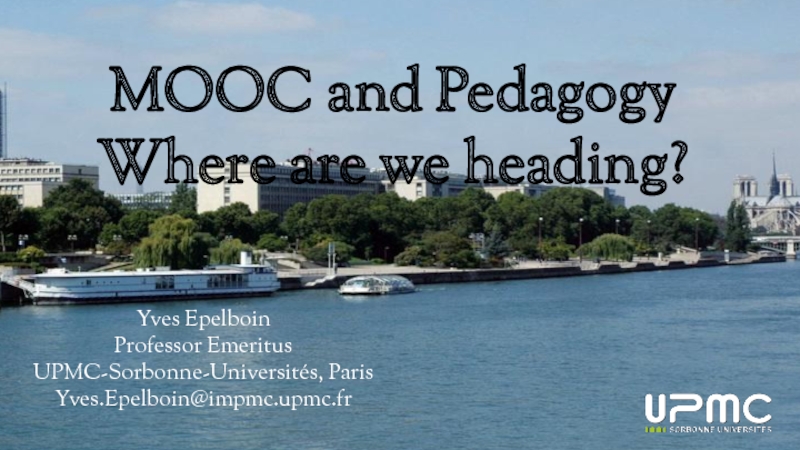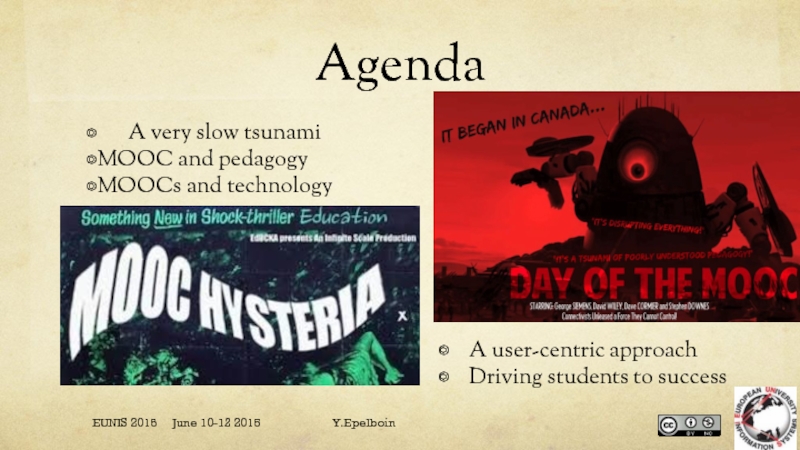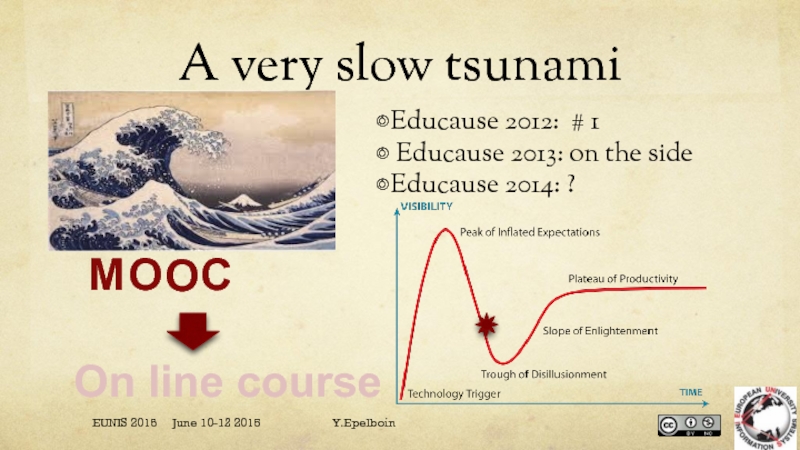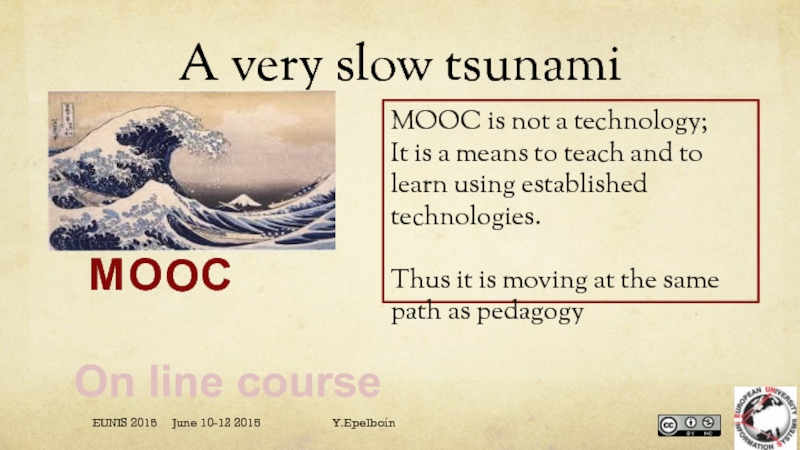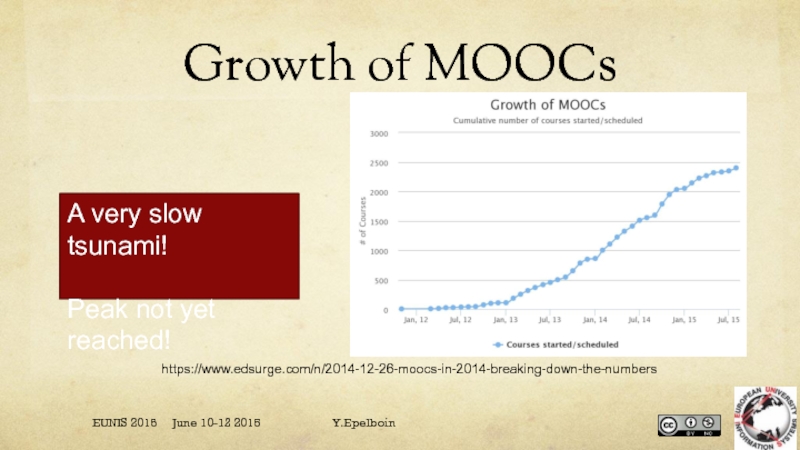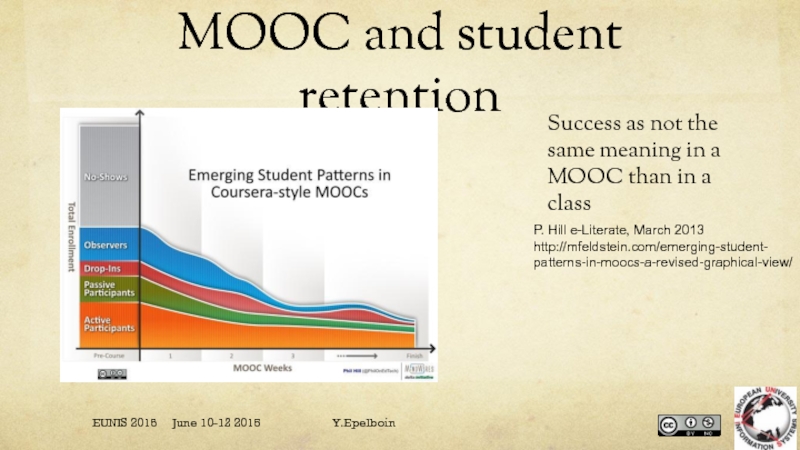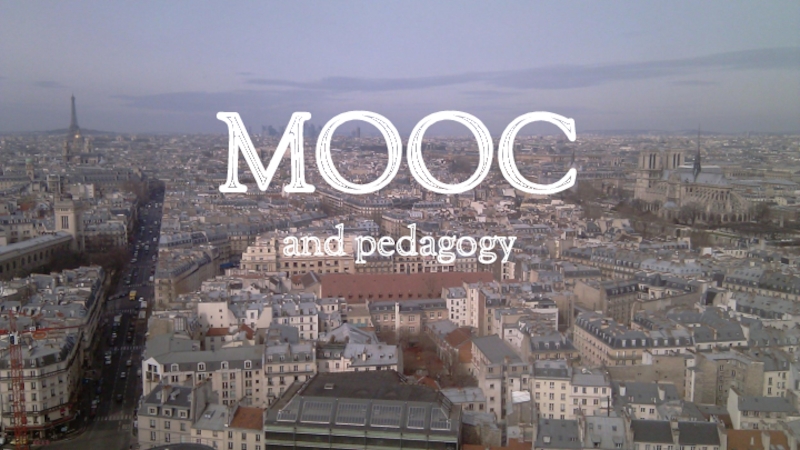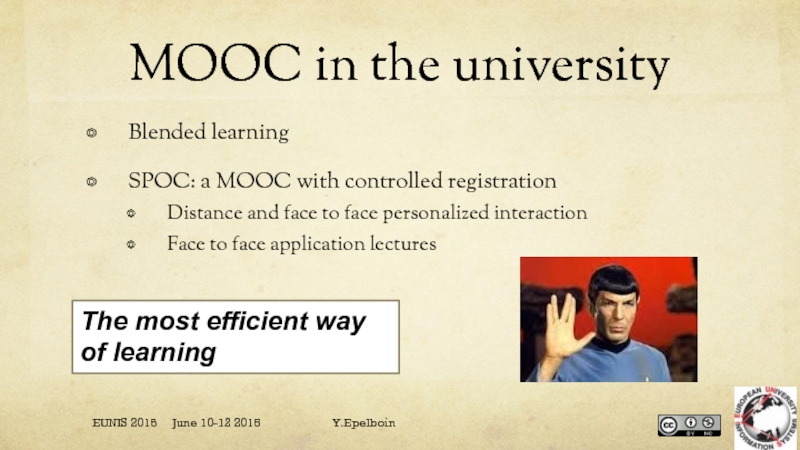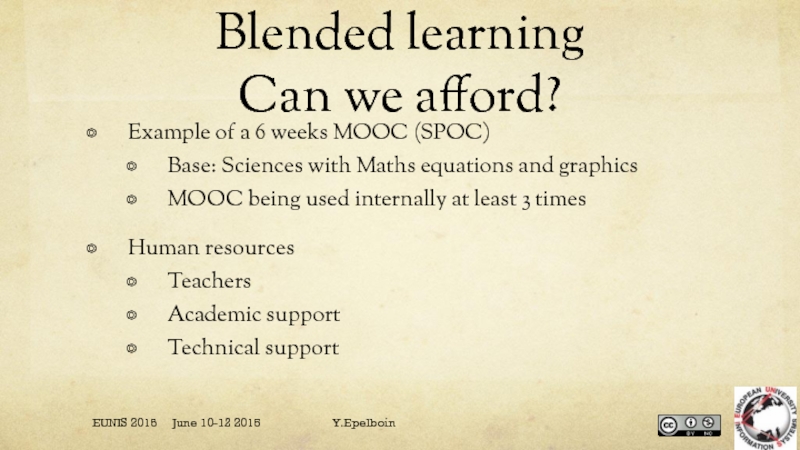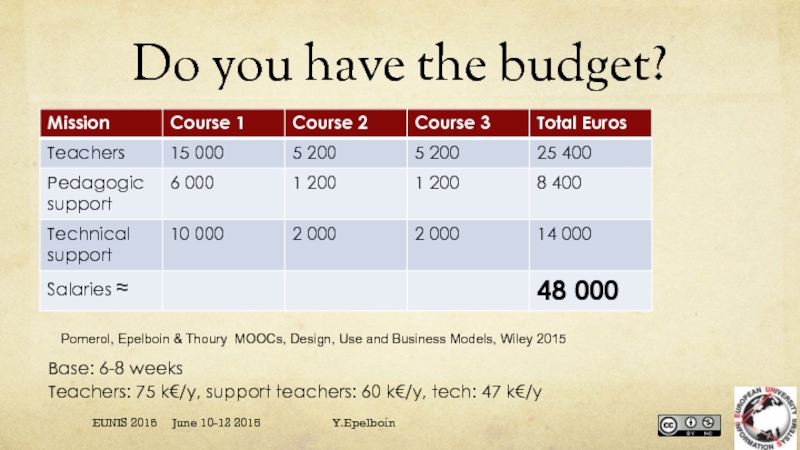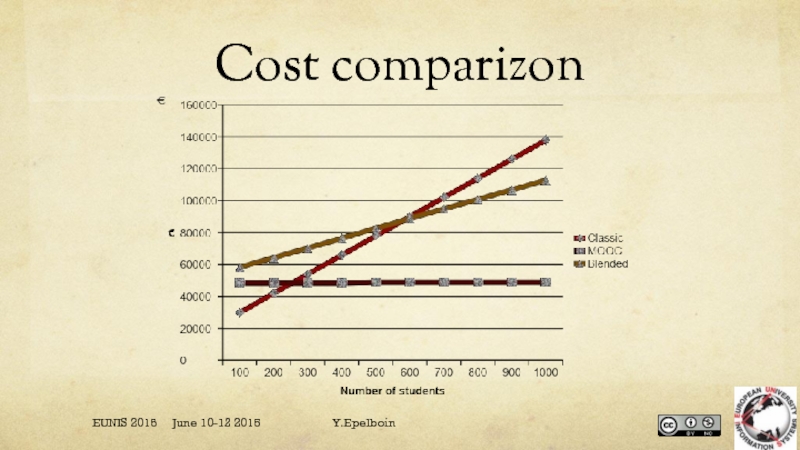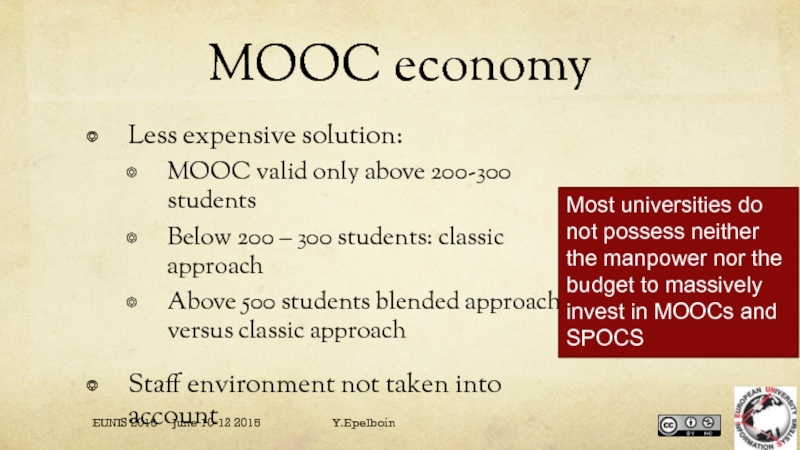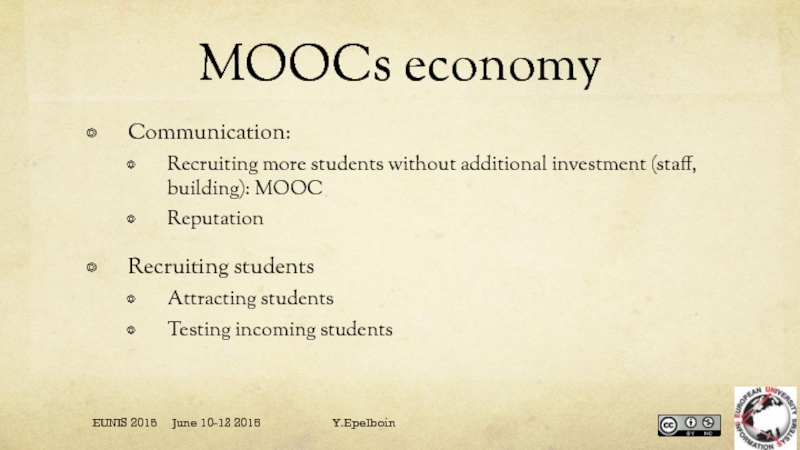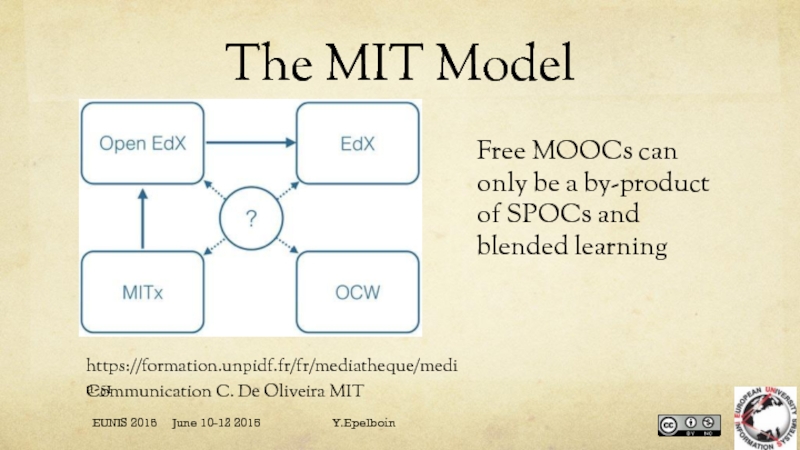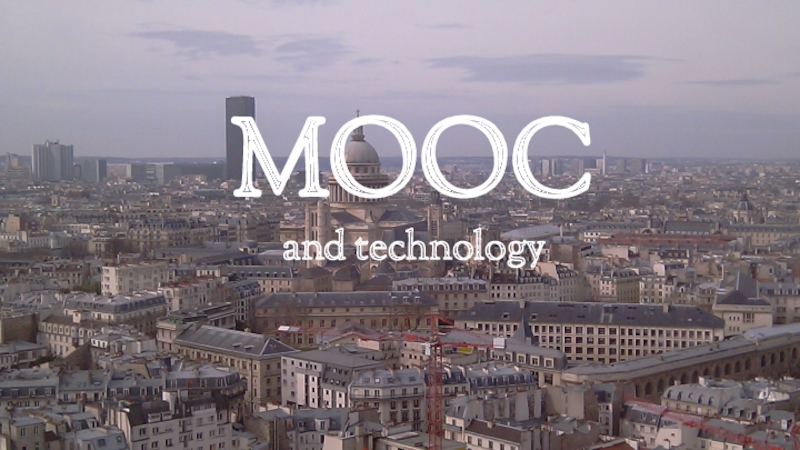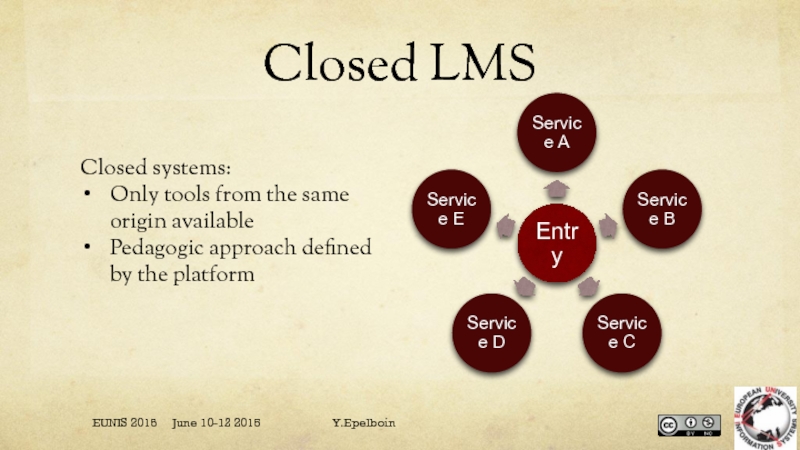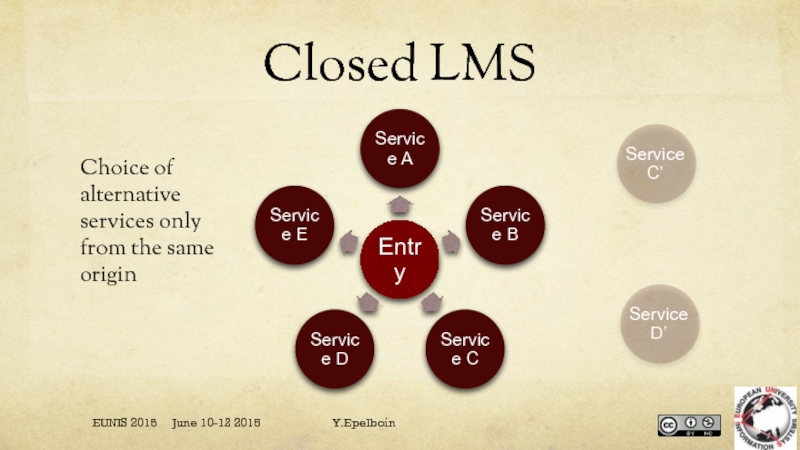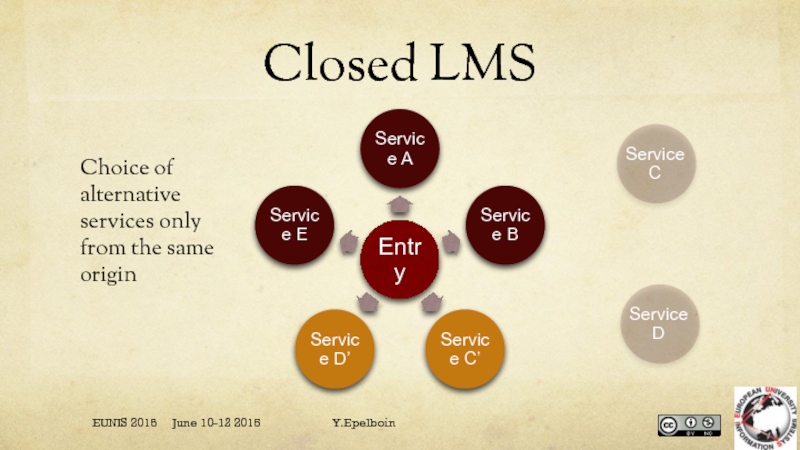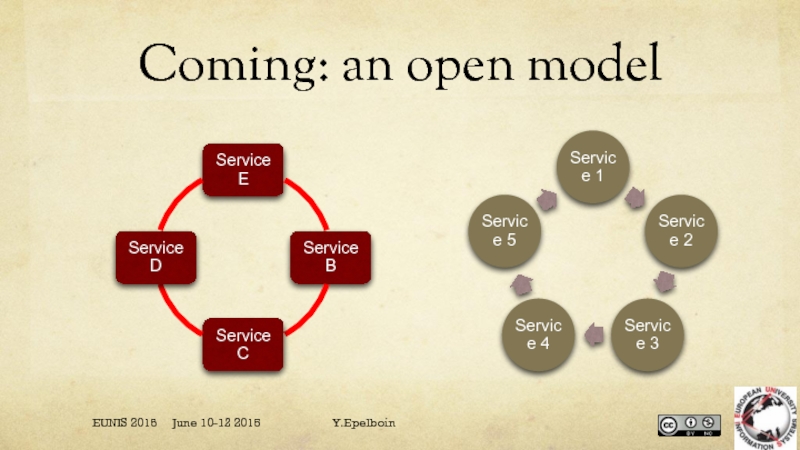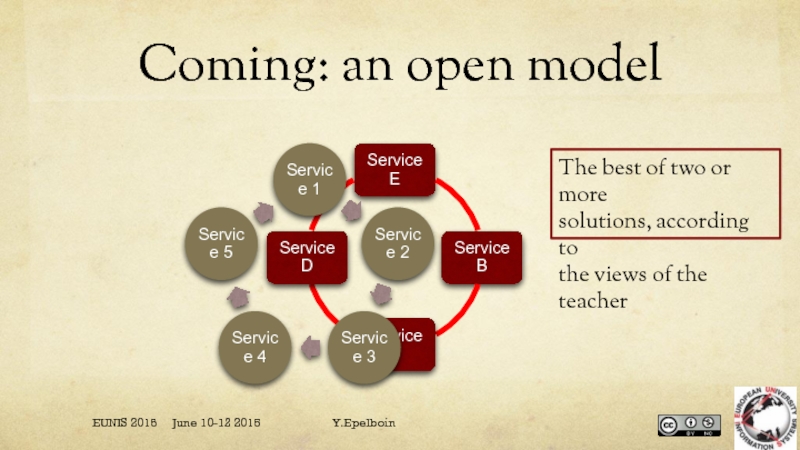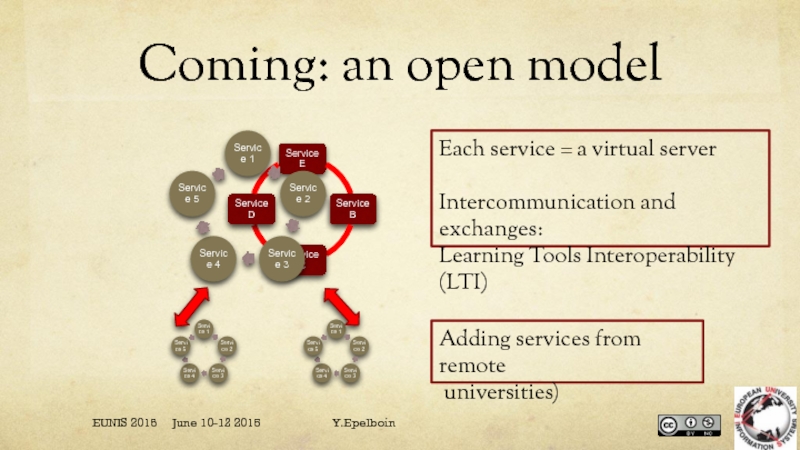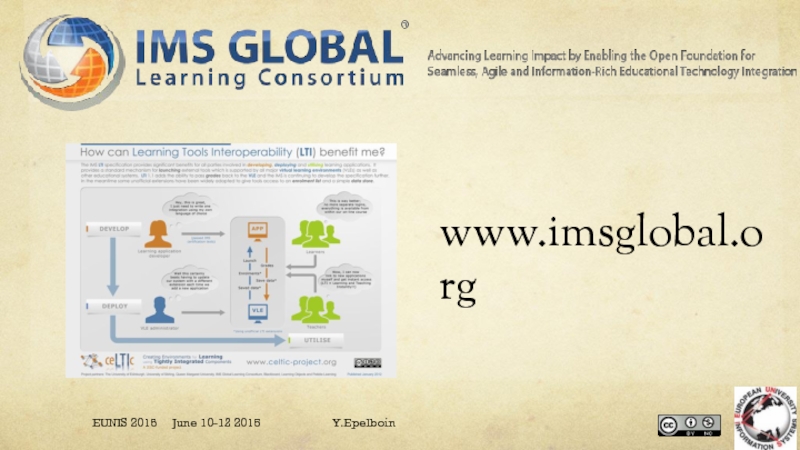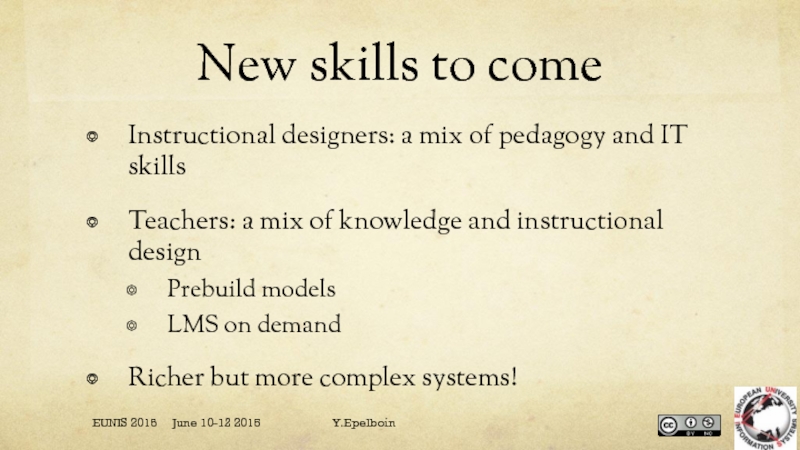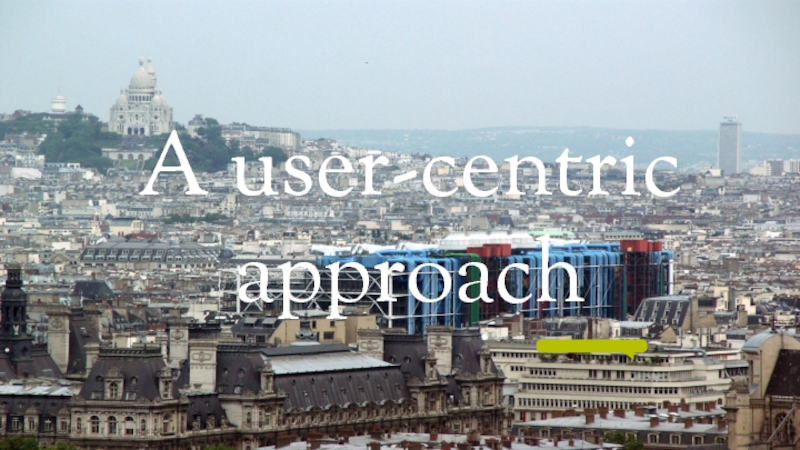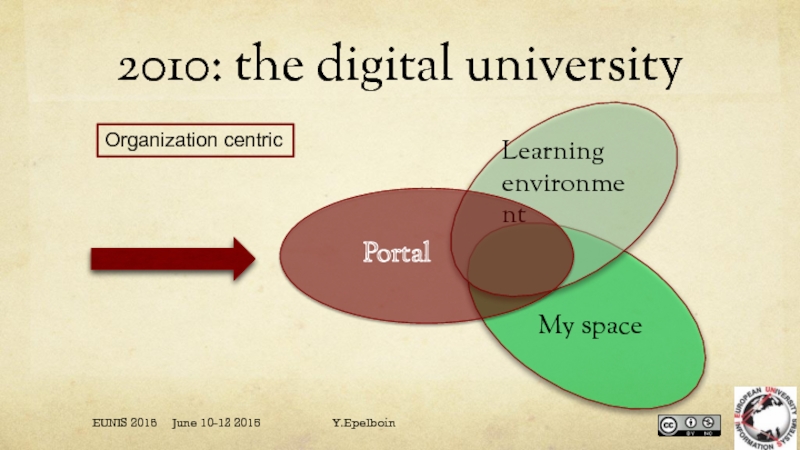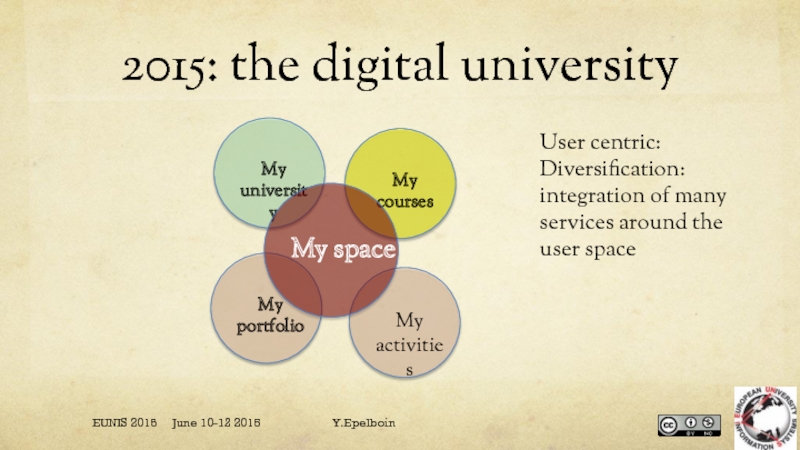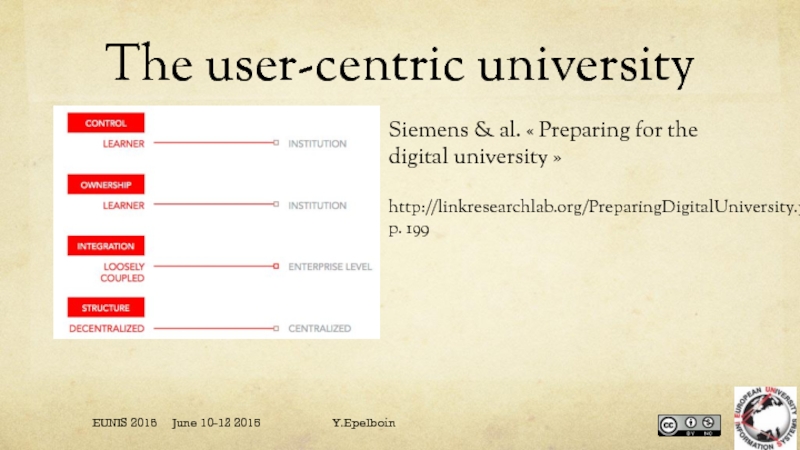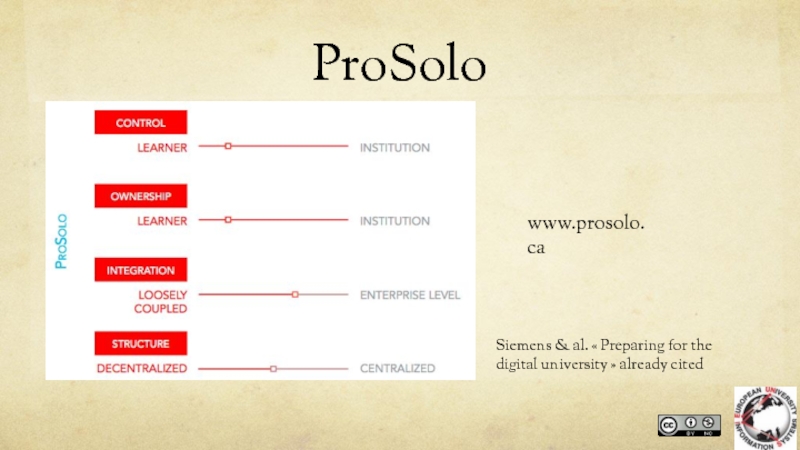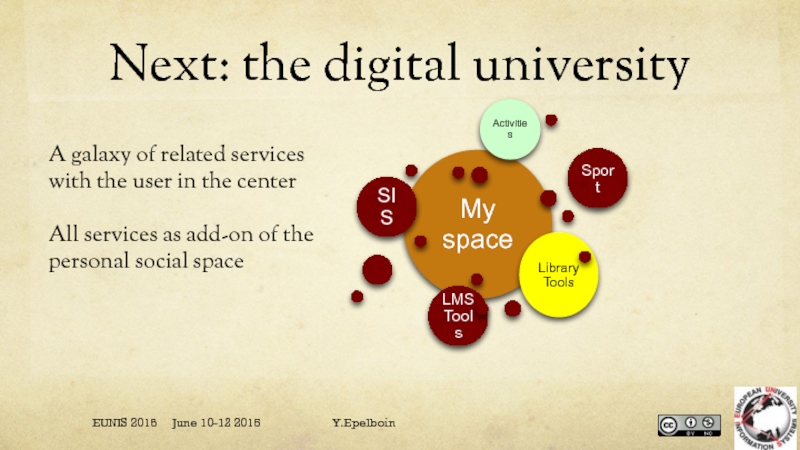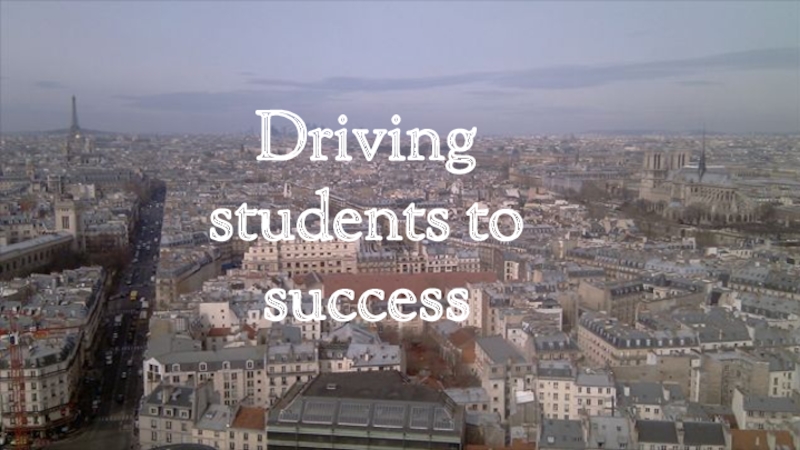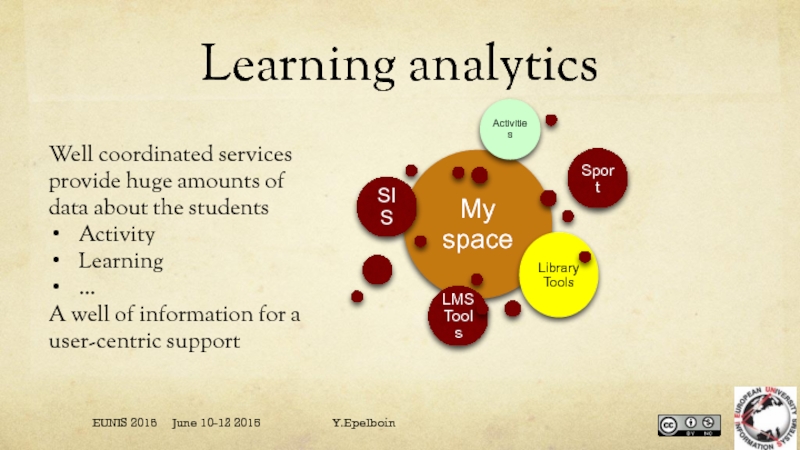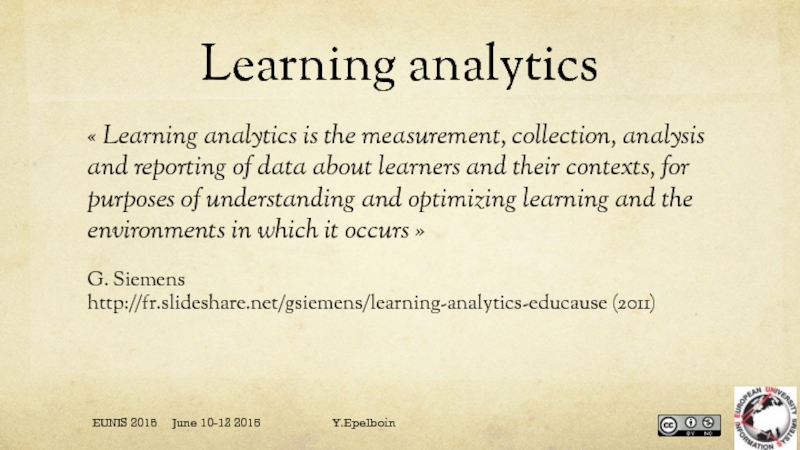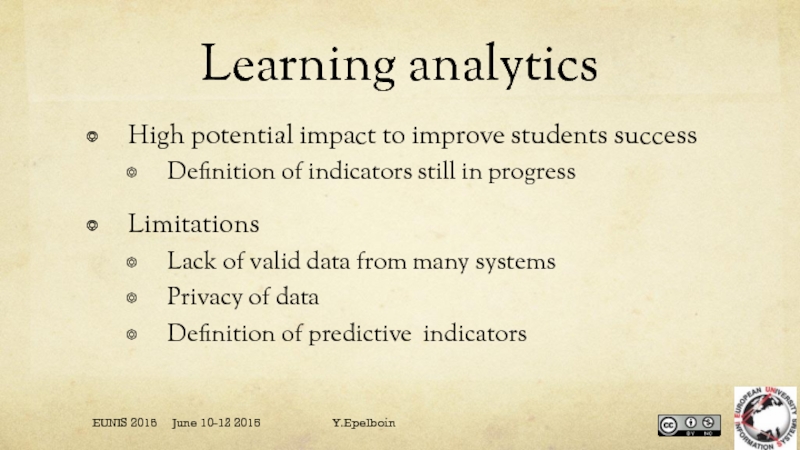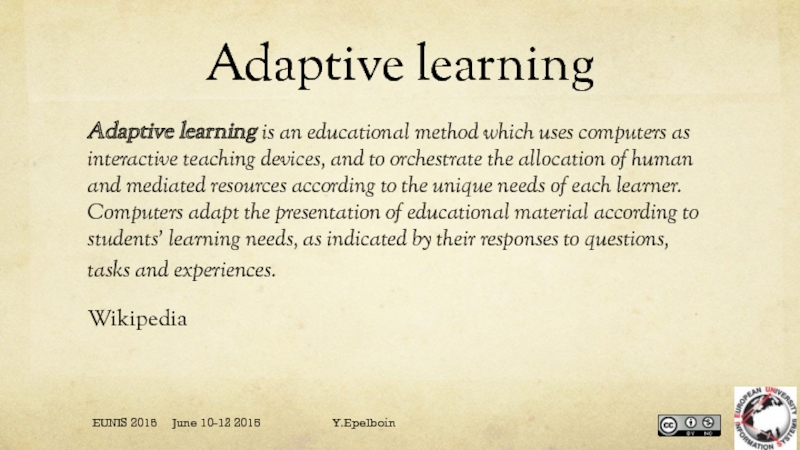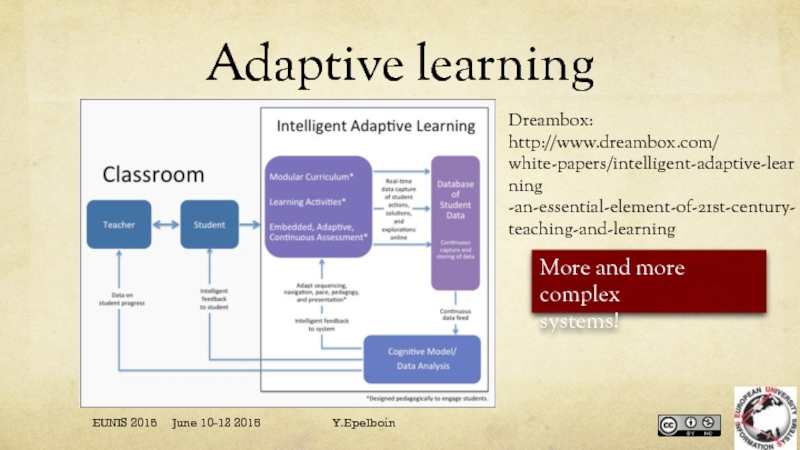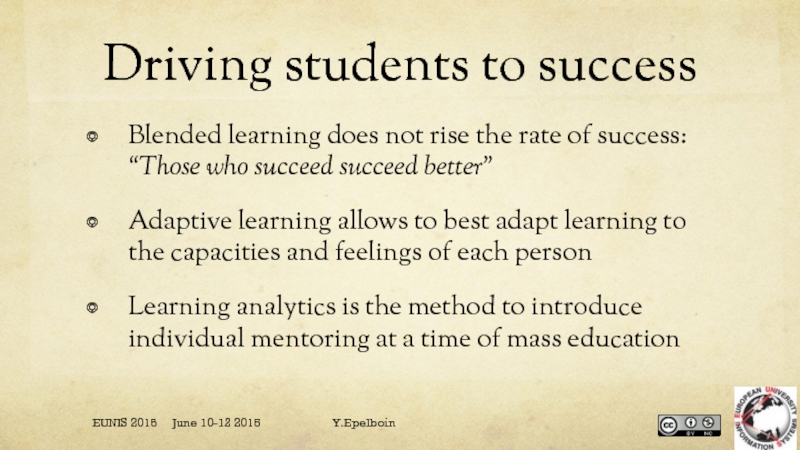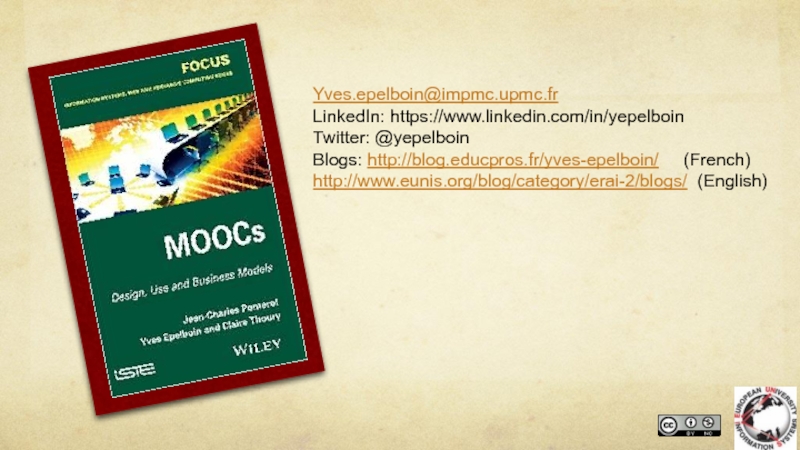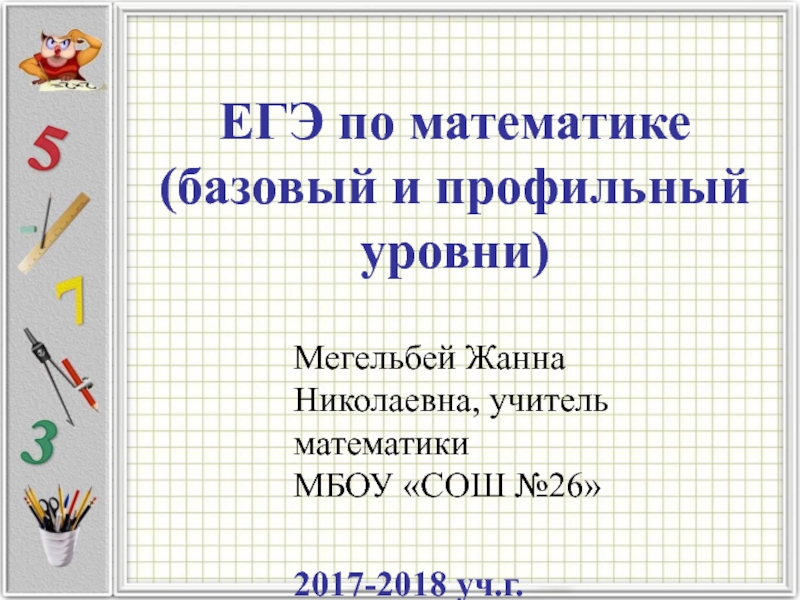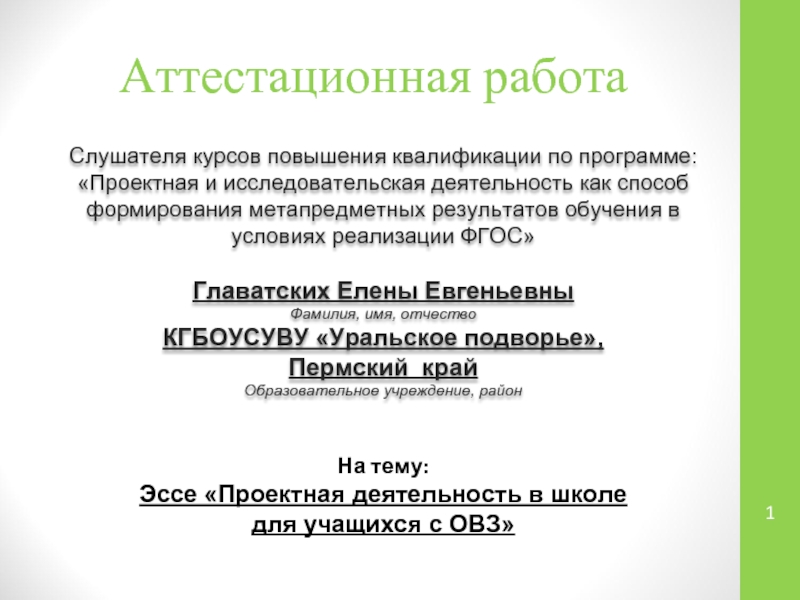- Главная
- Разное
- Дизайн
- Бизнес и предпринимательство
- Аналитика
- Образование
- Развлечения
- Красота и здоровье
- Финансы
- Государство
- Путешествия
- Спорт
- Недвижимость
- Армия
- Графика
- Культурология
- Еда и кулинария
- Лингвистика
- Английский язык
- Астрономия
- Алгебра
- Биология
- География
- Детские презентации
- Информатика
- История
- Литература
- Маркетинг
- Математика
- Медицина
- Менеджмент
- Музыка
- МХК
- Немецкий язык
- ОБЖ
- Обществознание
- Окружающий мир
- Педагогика
- Русский язык
- Технология
- Физика
- Философия
- Химия
- Шаблоны, картинки для презентаций
- Экология
- Экономика
- Юриспруденция
MOOC and Pedagogy Where are we heading? презентация
Содержание
- 1. MOOC and Pedagogy Where are we heading?
- 2. Agenda A very slow tsunami MOOC and
- 3. A very slow tsunami Educause 2012: #
- 4. A very slow tsunami MOOC is not
- 5. Growth of MOOCs https://www.edsurge.com/n/2014-12-26-moocs-in-2014-breaking-down-the-numbers EUNIS 2015 June
- 6. MOOC and student retention Success as not
- 7. MOOC and pedagogy
- 8. MOOC in the university Blended learning SPOC:
- 9. Blended learning Can we afford? Example
- 10. Do you have the budget? Base: 6-8
- 11. Cost comparizon € EUNIS 2015 June 10-12 2015 Y.Epelboin
- 12. MOOC economy Less expensive solution: MOOC valid
- 13. Blended learning economy Blended learning and distance
- 14. MOOCs economy Communication: Recruiting more students without
- 15. The MIT Model https://formation.unpidf.fr/fr/mediatheque/media-51 Free MOOCs can
- 16. MOOC and technology
- 17. Closed LMS EUNIS 2015 June 10-12 2015
- 18. EUNIS 2015 June 10-12 2015 Y.Epelboin
- 19. Closed LMS EUNIS 2015 June 10-12 2015
- 20. Coming: an open model EUNIS 2015 June 10-12 2015 Y.Epelboin
- 21. Coming: an open model The best of
- 22. Coming: an open model Each service =
- 23. www.imsglobal.org EUNIS 2015 June 10-12 2015 Y.Epelboin
- 24. New skills to come Instructional designers: a
- 25. A user-centric approach
- 26. 2010: the digital university Organization centric EUNIS 2015 June 10-12 2015 Y.Epelboin
- 27. 2015: the digital university EUNIS 2015 June
- 28. The user-centric university Siemens & al. « Preparing
- 29. Apereo Siemens & al. « Preparing for the
- 30. ProSolo Siemens & al. « Preparing for the digital university » already cited www.prosolo.ca
- 31. Next: the digital university EUNIS 2015 June
- 32. Driving students to success
- 33. Learning analytics EUNIS 2015 June 10-12 2015
- 34. Learning analytics « Learning analytics is the measurement,
- 35. Learning analytics High potential impact to improve
- 36. Adaptive learning Adaptive learning is an educational
- 37. Adaptive learning Dreambox: http://www.dreambox.com/ white-papers/intelligent-adaptive-learning -an-essential-element-of-21st-century- teaching-and-learning
- 38. Driving students to success Blended learning does
- 39. Summary
- 40. Conclusion An important challenge for the digital
- 41. Yves.epelboin@impmc.upmc.fr LinkedIn: https://www.linkedin.com/in/yepelboin Twitter: @yepelboin Blogs: http://blog.educpros.fr/yves-epelboin/ (French) http://www.eunis.org/blog/category/erai-2/blogs/ (English)
- 42. Discussion
Слайд 1MOOC and Pedagogy
Where are we heading?
Yves Epelboin
Professor Emeritus
UPMC-Sorbonne-Universités, Paris
Yves.Epelboin@impmc.upmc.fr
Слайд 2Agenda
A very slow tsunami
MOOC and pedagogy
MOOCs and technology
MOOCs for Europe
A user-centric
Driving students to success
EUNIS 2015 June 10-12 2015 Y.Epelboin
Слайд 3A very slow tsunami
Educause 2012: # 1
Educause 2013: on the
Educause 2014: ?
On line course
M
O
O
C
EUNIS 2015 June 10-12 2015 Y.Epelboin
Слайд 4A very slow tsunami
MOOC is not a technology;
It is a means
Thus it is moving at the same path as pedagogy
On line course
M
O
O
C
EUNIS 2015 June 10-12 2015 Y.Epelboin
Слайд 5Growth of MOOCs
https://www.edsurge.com/n/2014-12-26-moocs-in-2014-breaking-down-the-numbers
EUNIS 2015 June 10-12 2015 Y.Epelboin
A very slow
Слайд 6MOOC and student retention
Success as not the same meaning in a
P. Hill e-Literate, March 2013
http://mfeldstein.com/emerging-student-
patterns-in-moocs-a-revised-graphical-view/
EUNIS 2015 June 10-12 2015 Y.Epelboin
Слайд 8MOOC in the university
Blended learning
SPOC: a MOOC with controlled registration
Distance and
Face to face application lectures
The most efficient way of learning
EUNIS 2015 June 10-12 2015 Y.Epelboin
Слайд 9Blended learning
Can we afford?
Example of a 6 weeks MOOC (SPOC)
Base:
MOOC being used internally at least 3 times
Human resources
Teachers
Academic support
Technical support
EUNIS 2015 June 10-12 2015 Y.Epelboin
Слайд 10Do you have the budget?
Base: 6-8 weeks
Teachers: 75 k€/y, support teachers:
Pomerol, Epelboin & Thoury MOOCs, Design, Use and Business Models, Wiley 2015
EUNIS 2015 June 10-12 2015 Y.Epelboin
Слайд 12MOOC economy
Less expensive solution:
MOOC valid only above 200-300 students
Below 200 –
Above 500 students blended approach versus classic approach
Staff environment not taken into account
EUNIS 2015 June 10-12 2015 Y.Epelboin
Most universities do not possess neither the manpower nor the budget to massively
invest in MOOCs and SPOCS
Слайд 13Blended learning economy
Blended learning and distance learning for freshmen
Cheaper way to
Efficient means to attract distant students
A method to increase the participation of minorities?
Rare studies and small classes
If universities are able to work together
EdTech June 2-3 2015 London Y.Epelboin
Слайд 14MOOCs economy
Communication:
Recruiting more students without additional investment (staff, building): MOOC
Reputation
Recruiting students
Attracting
Testing incoming students
EUNIS 2015 June 10-12 2015 Y.Epelboin
Слайд 15The MIT Model
https://formation.unpidf.fr/fr/mediatheque/media-51
Free MOOCs can only be a by-product of SPOCs
EUNIS 2015 June 10-12 2015 Y.Epelboin
Communication C. De Oliveira MIT
Слайд 17Closed LMS
EUNIS 2015 June 10-12 2015 Y.Epelboin
Closed systems:
Only tools from
Pedagogic approach defined by the platform
Слайд 18EUNIS 2015 June 10-12 2015 Y.Epelboin
Choice of alternative services only
Closed LMS
Слайд 19Closed LMS
EUNIS 2015 June 10-12 2015 Y.Epelboin
Choice of alternative services
Слайд 21Coming: an open model
The best of two or more
solutions, according
EUNIS 2015 June 10-12 2015 Y.Epelboin
Слайд 22Coming: an open model
Each service = a virtual server
Intercommunication and exchanges:
Learning
EUNIS 2015 June 10-12 2015 Y.Epelboin
Слайд 24New skills to come
Instructional designers: a mix of pedagogy and IT
Teachers: a mix of knowledge and instructional design
Prebuild models
LMS on demand
Richer but more complex systems!
EUNIS 2015 June 10-12 2015 Y.Epelboin
Слайд 272015: the digital university
EUNIS 2015 June 10-12 2015 Y.Epelboin
User centric:
Diversification:
My space
Слайд 28The user-centric university
Siemens & al. « Preparing for the
digital university »
http://linkresearchlab.org/PreparingDigitalUniversity.pdf
p.
EUNIS 2015 June 10-12 2015 Y.Epelboin
Слайд 29Apereo
Siemens & al. « Preparing for the
digital university » already cited
EUNIS 2015
www.apereo.org
Слайд 31Next: the digital university
EUNIS 2015 June 10-12 2015 Y.Epelboin
A galaxy
All services as add-on of the personal social space
Слайд 33Learning analytics
EUNIS 2015 June 10-12 2015 Y.Epelboin
Well coordinated services provide
Activity
Learning
…
A well of information for a user-centric support
Слайд 34Learning analytics
« Learning analytics is the measurement, collection, analysis and reporting of
G. Siemens http://fr.slideshare.net/gsiemens/learning-analytics-educause (2011)
EUNIS 2015 June 10-12 2015 Y.Epelboin
Слайд 35Learning analytics
High potential impact to improve students success
Definition of indicators still
Limitations
Lack of valid data from many systems
Privacy of data
Definition of predictive indicators
EUNIS 2015 June 10-12 2015 Y.Epelboin
Слайд 36Adaptive learning
Adaptive learning is an educational method which uses computers as
Wikipedia
EUNIS 2015 June 10-12 2015 Y.Epelboin
Слайд 37Adaptive learning
Dreambox: http://www.dreambox.com/
white-papers/intelligent-adaptive-learning
-an-essential-element-of-21st-century-
teaching-and-learning
EUNIS 2015 June 10-12 2015 Y.Epelboin
More and more
Слайд 38Driving students to success
Blended learning does not rise the rate of
Adaptive learning allows to best adapt learning to the capacities and feelings of each person
Learning analytics is the method to introduce individual mentoring at a time of mass education
EUNIS 2015 June 10-12 2015 Y.Epelboin
Слайд 40Conclusion
An important challenge for the digital university in the coming years:
True
Tools and services will be more and more user-centric
The digital environment will be more and more complex
EUNIS 2015 June 10-12 2015 Y.Epelboin
Will the universities have the human and financial resources?
